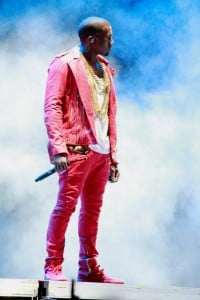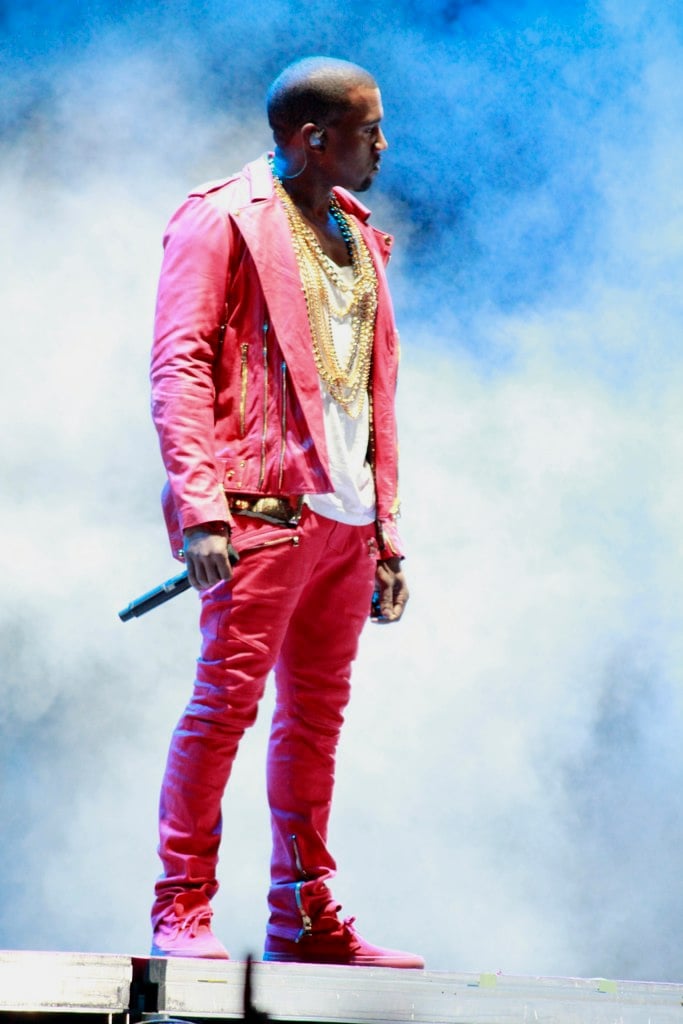Sometimes, in the light of his highly publicized antics, it’s easy to forget that Kanye West is actually a musician. It’s been difficult to keep pace with the convoluted journey he’s taken since early successes like “The College Dropout,” to take stock of the seismic changes in his personal and professional identity. From public feuds with the likes of Taylor Swift to his bizarre, high-exposure romance with Kim Kardashian, he’s become a reliable provider of marketable drama. And through it all, he’s run a relentless campaign of self-glorification, insisting again and again on his status as a godlike figure of artistic and cultural significance. Recently, during a backstage rant on the New York set of Saturday Night Live, he claimed to be “50 percent more influential” than Stanley Kubrick, Pablo Picasso and the Apostle Paul. It’s not clear what scale he’s using to measure influence, but his self-confidence is off the charts – remember, this is a man who is bold enough to refer to himself as “Yeezus.”

In the face of this perpetual, self-aggrandizing bluster, many have wondered whether his music can still measure up to the image he’s constructed. His most recent album, “The Life of Pablo,” is a wild, sprawling attempt to answer this question. Genre-bending and grandiose, it spans subjects as disparate as Twitter beefs, true love and spirituality. And unsurprisingly, it features no shortage of arrogance. Between graphic re-tellings of his sexual exploits, Yeezy takes credit for Taylor Swift’s fame and compares himself and Kim to Mary and Joseph. But if there’s any aspect of this album that legitimizes Kanye’s claim to greatness, it’s the moments of honesty, humility and subtle self-awareness that permeate these odes to success. Though he himself might not admit it, Kanye is at his best when he lets his guard down, when he’s humble enough to capitalize on the strengths of collaborators and acknowledge his own personal weaknesses.
To that effect, some of the strongest tracks on “TLOP” are his collaborations with other high-profile artists, such as Chance the Rapper and Kendrick Lamar. Chance and his associate Donnie Trumpet are actually behind much of “Pablo’s” production, and their influence is particularly evident on the excellent opening track “Ultralight Beam.” Kanye’s verses are complemented by tidal swells of church choir-backing vocals, and Chance himself makes a sharp, witty appearance, rhyming with customary passion and quirkiness. “Waves,” also written and arranged by Chance, is a surprise standout, leaning on flexible, flawless vocals from Chris Brown. And “No More Parties in LA” features a masterful guest verse from Kendrick Lamar, who gives listeners a stomach-twisting portrayal of the shallow SoCal party scene. In a departure from his usual egotism, Kanye’s occasional willingness to step back and cede the stage to talented fellow artists serves the album incredibly well.
West is clearly willing to dim his overblown persona to let other voices shine. At times, he also dials down his bravado to make room for admissions of and vulnerability, resulting in some of “Pablo’s” strongest lyrical and thematic moments. “Fade” and “FML” tackle issues of insecurity and uncertain love, addressing questions of family and fan loyalty against a backdrop of crisp, club-ready production. And his verse on “No More Parties in LA” is stronger for its self-awareness – he refers to himself as a “38-year-old 8-year-old with rich n•••• problems,” and quite perceptively rhymes “Thank god for me” with “Thank god for E!” These moments feel smarter and more convincing than when he crows about his sexual escapades or big-ticket purchases – closer, somehow, to the wit and lyrical flexibility that drew listeners to Kanye in the first place, back in the era of “College Dropout” and “Through the Wire.”
When a friend recently sent me a copy of the album, it came with a brief but spot-on assessment of the long-awaited project. “Kanye bleeds honesty,” he wrote – a statement that, I have to say, initially conjured some doubt in me. When I think of Kanye West, or at least the scandal-sparking rap Napoleon he’s become, honesty is not the first quality that comes to mind. But now, as I consider the emotional terrain that “Pablo” covers, I think I understand what he was getting at. Sure, there are moments where his boastfulness rings hollow, and many of the mid-album tracks falter – at times, his rapping and production seem loosely thrown together, spacier and less passionate than it was in his earlier work. But for every cringe-worthy verse about Maybachs and designer heels, there is an unexpected look at Kanye’s complex inner experience – like allusions to his struggles with mental illness, or hints at the conflict between his love for his family and his love for himself.
As long as Kanye can keep bleeding honesty, tapping into the themes and ideas that make him human, I’ll have the patience and interest to keep tuning in. It’s this self-awareness – and the willingness to collaborate with and draw from talented fellow artists – that makes the album worth listening to, even more so than other recent releases like “Yeezus.” Equal parts engrossing and irreverent, “The Life of Pablo” is a musical reflection of Kanye’s complex persona. And though it might not always hit the right notes, it truly is an honest project, faithful to this polarizing rapper’s singular vision.
Contact Clare Flanagan at ckflan ‘at’ stanford.edu.
